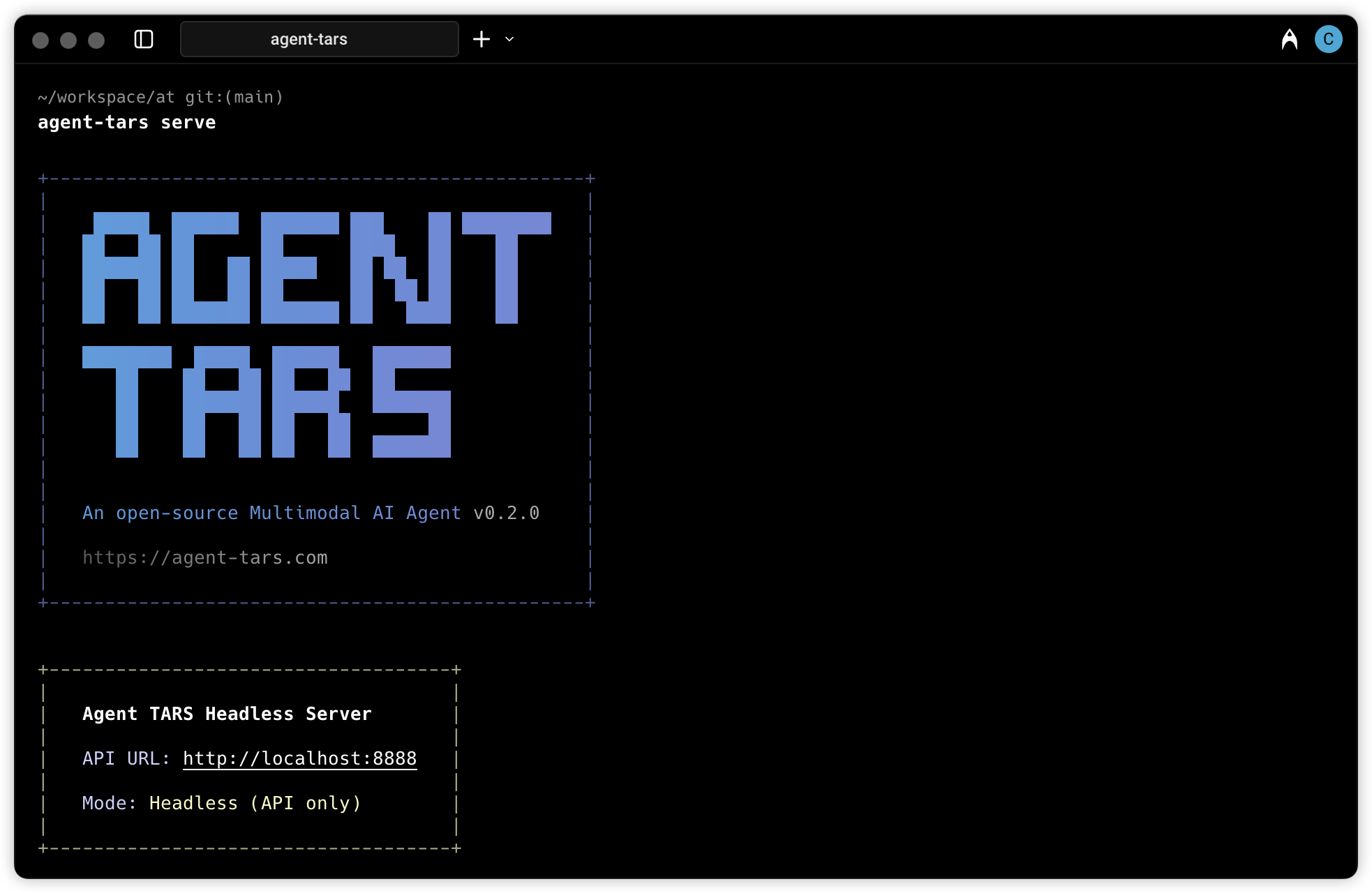Server
In most cases, you might not need the Agent TARS Server. However, when we later allow custom Web UI functionality, this document will be very helpful to you.
The Agent TARS Server is a server-side component in the Agent TARS ecosystem built on top of Agent TARS Core. It includes capabilities such as session storage management and a Web UI:

Basic Concepts
Agent TARS Server handles two main concepts:
- Session: Represents a complete Agent TARS interaction context, containing message history, tool calls, and state information
- Query: A single request executed within a session, which can be text or multimodal content
By default, Agent TARS Server's base path is /api/v1, through which you can access various server endpoints.
Server Configuration
Agent TARS Server offers multiple configuration options, including port settings, storage configuration, working directory, and sharing options. These configurations can be set through the Agent TARS configuration file.
Session Management API
Agent TARS Server provides a complete session lifecycle management API:
Create Session
Create a new Agent session:
Response:
Get Session List
Retrieve all sessions:
Response:
Get Session Details
Get detailed information for a specific session:
Get Session Status
Get the current running status of a session:
Response:
Get Session Events
Retrieve historical events for a specific session:
Get Latest Session Events
Retrieve events from the most recently updated session:
Update Session
Update session metadata:
Request body:
Delete Session
Delete a specific session and all its events:
Request body:
Generate Summary
Generate a summary for a session's conversation:
Request body:
Query Execution API
Agent TARS Server supports two query execution modes: standard mode and streaming mode.
Execute Standard Query
Request body:
For multimodal queries, query can be an array of content parts with text and images:
Execute Streaming Query
Streaming queries allow you to get real-time responses:
The request body is the same as for standard queries, but responses will be streamed in Server-Sent Events (SSE) format.
Abort Query
Interrupt a currently executing query:
Request body:
One-shot API
For convenience, Agent TARS Server provides one-shot APIs that create a session and execute a query in one step:
One-shot Query (Non-streaming)
Request body:
One-shot Query (Streaming)
The request body is the same as for non-streaming one-shot queries, but responses will be streamed in SSE format.
System API
Health Check
Check server status:
Response:
Sharing Functionality
Agent TARS Server provides powerful session sharing capabilities, allowing export and sharing of session history.
Get Sharing Configuration
Share Session
Request body:
Response:
WebSocket Communication
In addition to RESTful API, Agent TARS Server also provides WebSocket interfaces for real-time bidirectional communication.
Connect to a Session
Storage Providers
Agent TARS Server supports multiple storage providers for persistence:
- Memory Storage - In-memory storage (default, data lost on restart)
- File Storage - JSON file-based persistence
- SQLite Storage - SQLite database for better performance with large datasets
Storage can be configured in the config file:
Usage
Agent TARS Server is currently in early iteration, and APIs may change. It is currently recommended to use it through the built-in integration in Agent TARS CLI only, and not to directly depend on its APIs for development. We will provide self-deployment guides and stable SDK documentation in the future.
Using from Agent TARS CLI
Start the server using CLI:
You can specify server options in the configuration file:
Middleware Extensions
Agent TARS Server is based on Express and Connect middleware architecture and can extend server functionality through APIs:
Event Stream Processing
Agent TARS Server uses structured event streams for communication. Each event has a specific type and format, such as: user messages, assistant replies, tool calls, and system events.
Here's a typical event stream:
